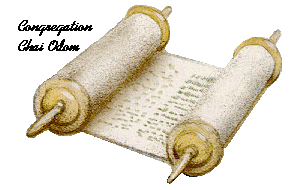|
Ki Sisa / כי תשא
Ki Sisa / כי תשא
In this weeks parsha
before the epic
episode of the
Golden Calf there
are four subjects
which are
introduced: 1) the
half shekel 2) the
washing utensils 3)
the anointing oil 4)
the incense or
kitores. Why are
these used to
introduce this
terrible story of
our failing as a
nation? The half
shekel, of course,
acts as atonement,
but what of the
others? Perhaps it
is a lesson we are
being taught about
what brings about an
“agel”. The washing
before the service
in the Mikdosh
represents the
sanctification of
our deeds. The
anointing of
ourselves and our
vessels represents
the dedication of
ourselves and our
deeds. And the
kitores is the
“sweet smell” and
love with which we
perform our
responsibilities.
Perhaps if we always
have these as
preparations we will
never create an “agel”.
On the contrary, it
is followed by a
command of Mishkon
and Shabbos,
sanctity of place
and time.
The people saw that
Moshe was slow in
returning and they
made the calf of
gold. We all stand
in amazement how a
people who had just
recently uttered the
memorable words
“naaseh v’nishma”
could stumble and
fall from such a
high pedestal. The
Bais Halevi answers.
They had achieved a
most lofty level of
performance of
mitzvos. At the same
time, their
perception and
insights into the
mystical and hidden
ways of the Torah
were enhanced.
However, here lies
their mistake. When
one wishes to create
a dwelling place for
G-d without being
duly commanded and
without proper
supervision, instead
of a Mishkon, one
could conceivably
create a calf of
gold.
Three thousand
people died because
of the Golden Calf.
The Medrash comments
“five times the
value is paid for
(stealing and
selling) the ox.”
What is the meaning
of this odd
statement? The Vilna
Gaon explains. The
Medrash explains on
the possuk in
Koheles “one in a
thousand men I
found, but not one
woman amongst them”.
This refers to the
Golden Calf. One out
of a thousand sinned
and no women were
among the sinners.
Now the question is
obvious – if they
were 600,000 in
number, then one of
a thousand would be
600 - so why three
thousand? To this
the other Medrash
answers that five
times paid for the
ox (calf). Five
times 600 are 3000.
“The rich will not
increase and the
poor will not
decrease from the
half shekel.” The
Chasam Sofer offers
a novel p’shat.
Although there is no
real reward in this
world for mitzvos,
we are told to give
a tenth to charity
and it will increase
our wealth. “Aser
bishvil shetisasher”.
In the case of the
half shekel,
however, it was
purely as an
atonement. Therefore
the Torah tells us
the rich will not
increase - i.e. they
will not get richer
(from giving the
half shekel) but
also the poor will
not decrease (their
wealth), for a
mitzva always
protects one from
loss.
Previous Parshos
Tazria
Metzora
Achrei Mos
Kedoshim
Emor
Behar
Bechukosai
Bamidbar
Shavuos
Naso
Behalosicha
Shilach
Korach
Chukas-Balak
Pinchos
Matos-Masei
Devorim
Voeschonon Ekev
Reah
Shoftim
Ki Seitzei
Ki Savo
Nitzovim
- Vayelech Rosh
HaShana Haazinu-Yom
Kippur Sukkos V'zos
HaBrocha
Breishis
|





